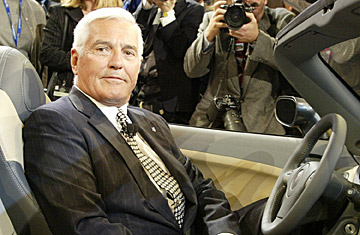
Former vice chairman of the Chrysler Corporation, Bob Lutz
(8 of 11)
WALTER ISAACSON: Bob?
ROBERT A. LUTZ: Well, if we're in the computer area, I think venture capital and the people who put up the venture capital may be heroes, but they were just performing the same lubricating function that they perform for any nascent industry and in computers it's— I would argue it's go different.
Made a huge contribution, but it's still off into the finance and financing contribution.
To me, once again I would like — probably reflecting my age — but I'd like to step back and before you can do personal computers and before you can invent a lot of software for computers and dominate the software of computers somebody has got invent the computer and start the computer industry.
And that was T.J. Watson of IBM. I think, just like you can't overlook— you can't step over Ford, if you're talking about the automobile industry, I don't see how you can— you can talk Steve Jobs or Bill Gates, talking about computers, without really talking about Watson and his role at IBM.
WALTER ISAACSON: Yeah, I think Watson clearly sets the stage for the computer age.
ROBERT A. LUTZ: Oh, sure.
NORMAN PEARLSTINE: At the risk of alienating both Darla and Geraldine, I would go back say that we have seen instances where the was a lot of capital that couldn't find anything smart to invest, and God knows we've found a lot of smart people with the next great idea who can't get funding.
And then we've found people who've gotten the funding and haven't known what to do with it. What I think is unique in this century and unique to America has been those captains of industry who have been able to manage large enterprises in these areas, to teach elephants to dance, if you will.
And I would say that Gates in that respect and Watson to a degree with IBM— Watson, Jr., particularly, you'd have to say, really were able to take this brilliant idea and available capital and then build operations of scale that really made a difference in the business climate and in our lives.
And so clearly I think Gates is not the smartest person to ever deal with computers in terms of pure technical skills but combining the technical skill, the marketing skill, the management skill, and the financial skills is what makes him and Microsoft so unique to me.
WALTER ISAACSON: Who would say? Steve Jobs, who is somebody who invents the notion of personal computer and can't really manage, I mean, he keeps losing the enterprises or whatever? Or Bill Gates, who got it kind of lucky when IBM let him keep the software code, but then was able to build a huge corporation? Who will have more impact?
RAY BRADY: Without taking any— without taking anything away from Bill Gates, I always go for people have stood the test of time. So, for that reason, I would go for the two Watsons. And especially the 360, which really made the industry—
NORMAN PEARLSTINE: Absolutely.
RAY BRADY: And it's not that easy an industry to really survive. I mean, to survive in.
Who made the first big computer — Univac? Who was the company that made it? I mean, who remembers today, Univac and the company that made it, which was Remington Rand?
In other words, it's been a very, very tough industry to endure in, and certainly IBM has stood the test of time. I'm sure Gates will, but for now my money is on the two Watsons.
WALTER ISAACSON: What about getting overseas again? I mean, we're becoming very American-centric. What about Morita at Sony? Where would put him, Geraldine? Or—
RAY BRADY: I would put Morita right up top, too. One of the things that always impressed me about him was with the Walkman. He was walking along the street one day, and he thought it would be pleasant to listen to music. And, he said, "But I wouldn't want to interfere with my neighbors," which is typically Japanese.
So, he decided the Sony Walkman, himself, the chairman of the board. And many of these people that run huge corporations are so far removed from the business they really don't know what's going on. And that has always impressed me about him.
And remember the people who came up with sound on tape was an American company — Ampex — which didn't know what to do with it. Nobody could— none of the Americans could figure out, "Well, this is fine. You can put sound on tape. What'll we do with it?"
WALTER ISAACSON: Let me throw out the whole area of retailing, which is something that America has excelled at in the world, to some extent, this century — creating new ways from— starting with Sears Roebuck, having laid the foundation in this century, but going to Sam Walton; Ray Kroc for franchising, that sort of thing; ????Woodrow [sp] for Coca-Cola.
NORMAN PEARLSTINE: Levitt for housing.
WALTER ISAACSON: Yeah, well.
I mean, Levitt to me is one of the people who changed the way we live by— I mean, Darla, you mentioned it earlier about—
